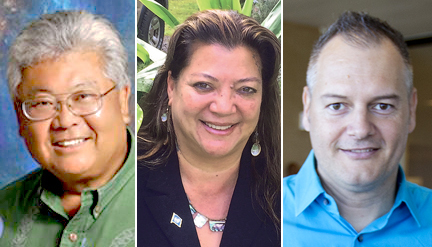Three candidates vie for House District 3 seat

The House District 3 race is probably the closest it gets to putting the Thirty Meter Telescope on the ballot.
ADVERTISING
Kealoha Pisciotta, a petitioner in TMT’s contested case hearing and one of the main spokespeople for opponents of the $1.4 billion project, is running against Rep. Richard Onishi in the Nov. 8 general election.
Onishi, a Democrat, has represented the district in the state Legislature, which stretches from Hilo to Ka‘u, since 2012.
Libertarian Gregory Arianoff also is running. He didn’t respond to interview requests by deadline.
Onishi, who is vice chairman of the House Agriculture Committee, said his priorities are agriculture and education. He also supports building TMT on Mauna Kea, citing high-tech jobs it would create.
“I think that particular project has been one of the most vetted projects in recent history,” said Onishi, 62.
Pisciotta, who is running as a Green Party candidate, said she was motivated to run by the candidacy of Sen. Bernie Sanders during the Democratic presidential primary. She said she caucused for Sanders but chose to run as a Green, believing the party better reflects her values.
“I think we all were brought to excitement in the idea of making political and social change with Bernie,” Pisciotta said.
If she wins, she would be one of a handful of Green Party candidates elected to a partisan position in the state. Others included Keiko Bonk, Julie Jacobson and Bob Jacobson, each elected to the Hawaii County Council before seats became nonpartisan.
If elected, Pisciotta said she also wants to support small farmers in the mainly rural district, with a preference for organic farming. She said she wants to see Hawaii Island be able to feed itself and would like to see fishponds put back to use.
“One of the problems of globalization is that everything comes from outside and we need to think about our stuff and really take time to envision how we want Hawaii to be,” Pisciotta said.
The two candidates differ on another controversial issue: genetically modified organisms.
Onishi said he supports all types of agriculture, including organic and GMO crops. He referred to the success of the transgenic Rainbow papaya, which is resistant to the ringspot virus, as an example of why he thinks the state should not close the door on GMO food.
Pisciotta, 47, said she wants to at least see “buffer zones” around farms growing transgenic crops and labeling of food with GMO ingredients. She said she would consider a ban on transgenic crops.
The World Health Organization says “no effects on human health have been shown as a result of the consumption of (GMO) foods by the general population.” But Pisciotta inverts the question regarding health effects. She said researchers need to prove that GMO foods are not causing harm, rather than focus on the lack of evidence that they are dangerous.
“They really do need to show that it’s not going to hurt people,” she said. “People in Hawaii are not their guinea pigs.”
On education, Pisciotta said she supports the Hawaii State Teachers Association’s 10-point plan that included public preschools and providing teachers with better pay, in addition to other proposals.
“My basic platform is improving our health, education and jobs, like everyone else,” she said. “But it’s how you go about that.”
Pisciotta said she wants to “redefine progress.”
“Progress is what advances our culture, both spiritually, physically, materially, and what also feeds the planet and doesn’t degrade it,” she said.
Pisciotta, a former telescope worker who became one of the most outspoken critics of observatory development on Mauna Kea, said she wants to see all existing telescopes to start paying substantial rent to the state. Currently, observatories on the mountain pay a nominal $1 a year for their subleases, though nonmonetary contributions, such as observing time for UH, are part of the deal.
UH officials have said any new subleases will cover significant portions of the cost of managing the mountain.
Onishi said aging buildings at some schools in his district is a concern.
“Education, to me, is one of the most important aspects of affecting the children’s lives in our district,” he said. “We need adequate facilities in order for them to learn.”
Onishi said he is interested in replacing the state’s gas tax with a road usage fee. He said he has offered his own family to participate in a pilot study. He expects the state to again seek increases in gas tax or registration fees to fund road projects next legislative session. The tax and fees are the main funding source for roads.
“We need to adjust what fees we’re going to increase and how we’re going to do it to make it balanced,” Onishi said. “I believe there needs to be (increases). We still have a need for new infrastructure.”
He said the state should balance current and future needs when deciding what to do with a $1 billion surplus. Onishi said it could be used to address prison overcrowding.
“It depends on the financial picture coming down the road,” he said.
Regarding use of the surplus, Pisciotta said she didn’t know if she was ready to answer that question, but added “education would be a good start.”
Email Tom Callis at tcallis@hawaiitribune -herald.com.


